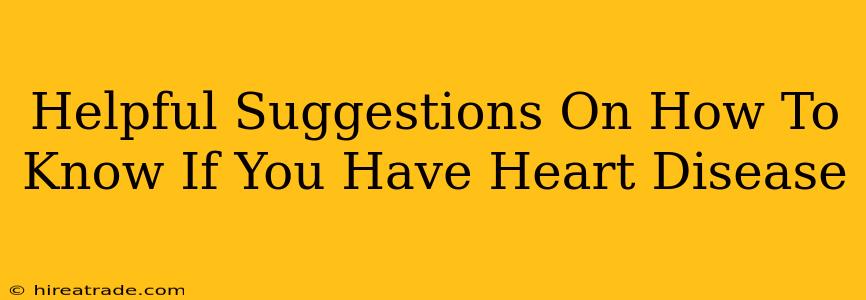Heart disease is a serious health concern, affecting millions worldwide. Early detection is crucial for effective treatment and improving your chances of a positive outcome. While only a doctor can diagnose heart disease, understanding the potential signs and symptoms can empower you to seek medical attention promptly. This guide provides helpful suggestions on recognizing potential indicators of heart disease.
Understanding the Risks: Who's Most Vulnerable?
Before we delve into symptoms, it's important to understand who is at higher risk of developing heart disease. Several factors contribute to your risk, including:
- Family history: A strong family history of heart disease significantly increases your chances.
- Age and gender: Risk generally increases with age, and men tend to develop heart disease earlier than women.
- Lifestyle choices: Unhealthy habits like smoking, poor diet, lack of physical activity, and excessive alcohol consumption are major risk factors.
- Underlying health conditions: Conditions like high blood pressure, high cholesterol, and diabetes significantly increase your risk.
- Obesity: Being overweight or obese puts a strain on your heart.
Recognizing the Warning Signs: Symptoms of Heart Disease
While some people experience no symptoms until a serious event like a heart attack, others might notice subtle changes. It's crucial to pay attention to your body and seek medical advice if you experience any of the following:
Chest Pain or Discomfort
This is perhaps the most well-known symptom. It can manifest in various ways:
- Angina: A squeezing, pressure, fullness, or pain in the center of your chest that can last for several minutes.
- Sharp, stabbing pain: While less common, a sharp pain in the chest could also indicate a problem.
- Discomfort radiating to other areas: Pain can radiate to the left arm, jaw, neck, back, or stomach.
Shortness of Breath
Unexpected shortness of breath, especially with minimal exertion, warrants immediate attention. This can occur even when resting.
Irregular Heartbeat (Palpitations)
Feeling your heart fluttering, pounding, or racing can be a sign of an underlying heart condition.
Dizziness or Lightheadedness
Frequent dizziness or lightheadedness, especially accompanied by other symptoms, shouldn't be ignored.
Swelling in the Legs, Ankles, or Feet
Fluid retention leading to swelling in the lower extremities can indicate heart failure.
Fatigue and Weakness
Unexplained persistent fatigue and weakness, even after getting enough rest, could be a symptom.
Nausea or Vomiting
In some cases, nausea and vomiting can accompany chest pain or other heart-related symptoms.
When to Seek Immediate Medical Attention
Call emergency services immediately if you experience:
- Sudden, severe chest pain
- Shortness of breath accompanied by chest pain
- Sudden dizziness or lightheadedness leading to fainting
The Importance of Regular Checkups
Regular checkups with your doctor are crucial, especially if you have risk factors for heart disease. These checkups allow for early detection and preventative measures. Your doctor may recommend blood tests to check cholesterol levels, blood pressure, and blood sugar. They may also perform an electrocardiogram (ECG) to assess your heart's electrical activity.
Conclusion: Proactive Care is Key
Heart disease can be managed effectively with early detection and appropriate treatment. By being aware of the risk factors and potential symptoms, you can take proactive steps to protect your heart health. Don't hesitate to seek medical attention if you experience any concerning symptoms. Your health is your most valuable asset.

